Focus on English grammar with 5 books in the “Focus on Grammar” series
Focus on Grammar is Pearson Education's 5-book series that teaches English grammar from beginner to advanced levels through practical, real-world contexts. The series uses a four-step methodology: contextual introduction, detailed presentation, focused practice, and communication application.
Designed for beginners, intermediate learners, and English teachers, the series emphasizes context-based learning with extensive exercises, detailed explanations, and comprehensive support materials. User feedback praises its clear structure and practical relevance across proficiency levels, though it may overemphasize grammar at the expense of integrated language skills.

I. General Information about Focus on Grammar
First, let's explore the general information about the book Focus on Grammar along with the appropriate target audience for using this book!
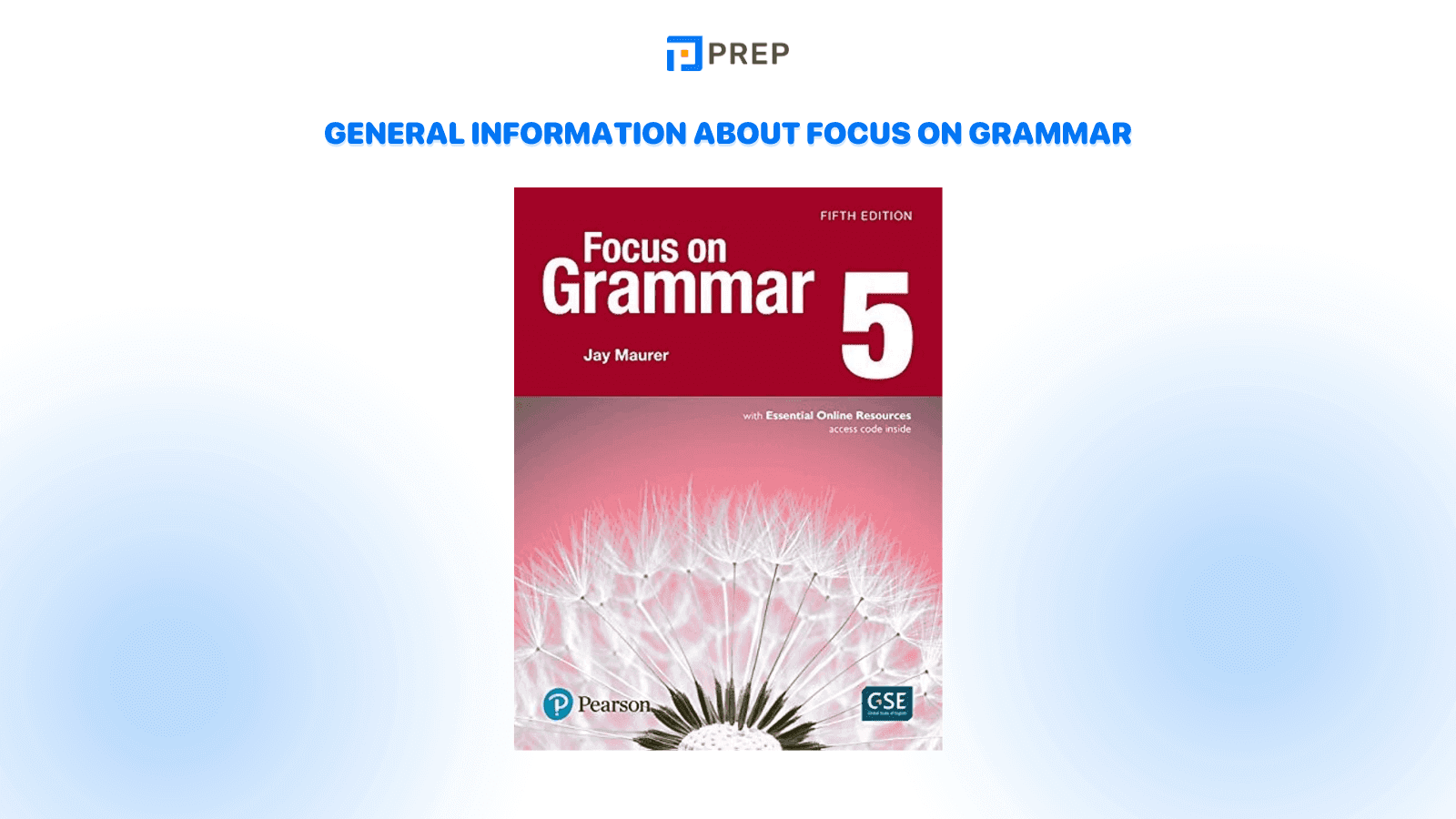
1. Overview of the book's content and author
Focus on Grammar is a famous and popular textbook for teaching and learning English. This book is published by Pearson Education, one of the leading companies in the field of education, and has become an important learning resource for English language learners worldwide.
The 5-book series of Focus on Grammar helps learners grasp English grammar structures from basic to advanced levels. The material includes various editions and levels to cater to the learning needs of individuals, from beginners to those who want to enhance their advanced grammar knowledge.
Each book in the Focus on Grammar series focuses on specific aspects of grammar, helping learners understand how to use sentence structures in everyday communication. The book provides illustrative examples and exercises for practice and testing the learners' grammar knowledge. Additionally, the book includes detailed explanations and aids self-study effectively.
|
2. Targeted learners of Focus on Grammar
The Focus on Grammar series is designed to serve a wide range of English language learners, from beginners to individuals with basic knowledge who want to enhance their grammar skills. The most suitable audience for studying Focus on Grammar includes:
- Beginners: Focus on Grammar provides a good grammar learning path for beginners of English (Book 1). It helps them understand and use basic structures and build accompanying vocabulary.
- Intermediate English learners: Learners with basic knowledge of English can use Focus on Grammar 1, 2, and 3 to enhance their grammar skills, learn more complex grammar structures, and expand their vocabulary.
- English communicative learners: Focus on Grammar provides the usage of grammar in daily communication situations, so learners who want to improve their speaking and writing skills in English can make use of Focus on Grammar as a reliable learning resource.
- English teachers: If you are an English teacher, you can consider Focus on Grammar as a reputable reference material for knowledge and exercises..
II. Main Content Structure of the Book
To determine which book is suitable for your English language proficiency, PREP has analyzed the detailed content structure for each book for you to grasp the most general information!
1. Focus on Grammar 1
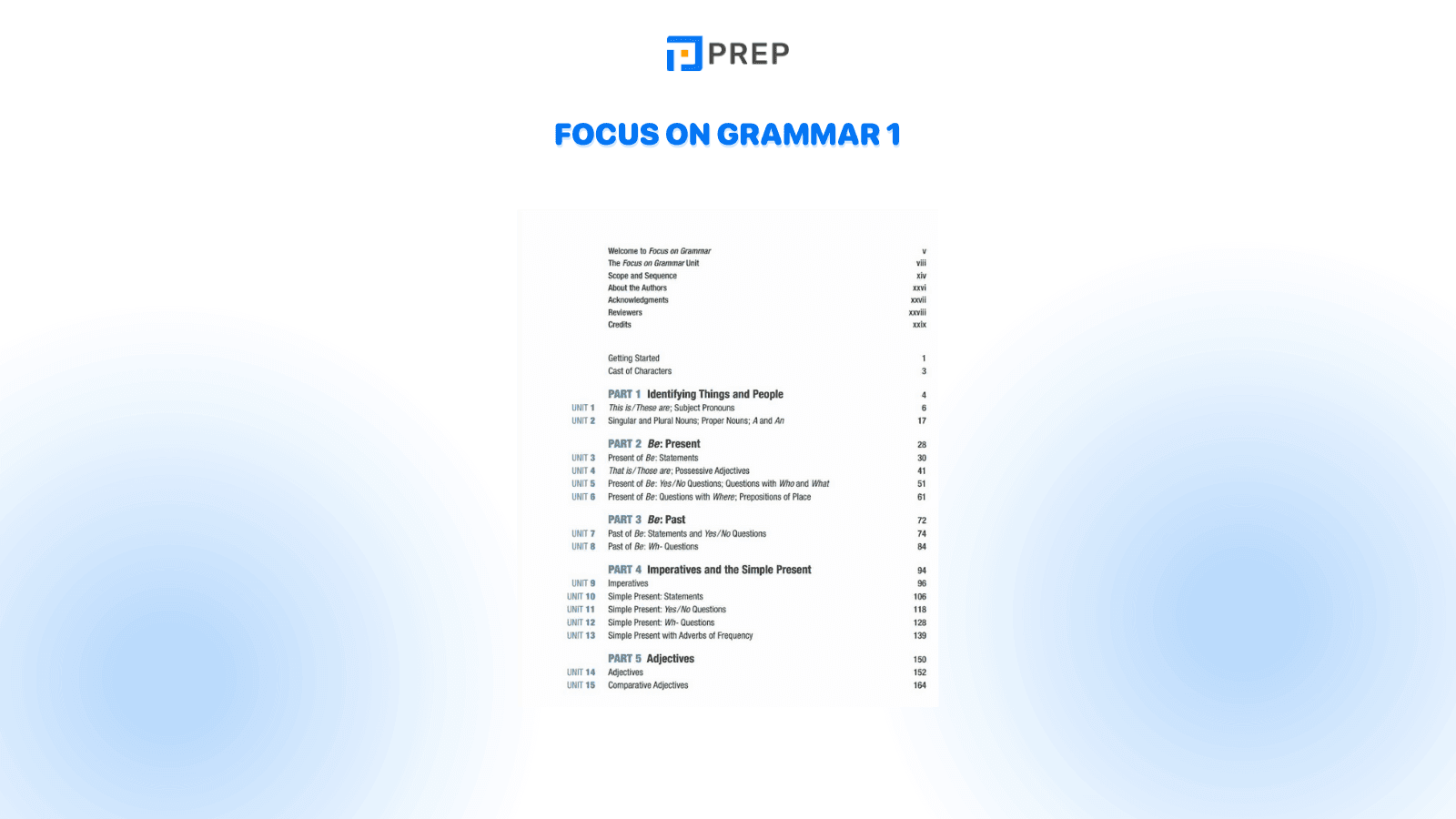
|
Book structure |
Detailed content |
|
|
Welcome to Focus on Grammar |
General introduction to Focus on Grammar 1 |
|
|
Scope and Sequence |
Detailed book map of the Focus on Grammar book. |
|
|
Getting Started: Classroom Instructions |
Familiarize yourself with symbols and requirements in the Focus on Grammar book. |
|
|
Part I |
This is/ There are; Subject Pronouns; Nouns |
Instructions on how to use "This is/There are," Pronouns, and Nouns. |
|
Part II |
Be: Present; That is/Those are; Possessive Adjectives |
Instructions on how to use the verb "to be" in the present tense, "That is/Those are," Possessive Adjectives. |
|
Part III |
Be: Past |
Instructions on how to use the verb "to be" in the past tense. |
|
Part IV |
Imperatives; Simple Present |
Instructions on how to use imperative sentences, the simple present tense. |
|
Part V |
Simple Present: Questions, Be and Have; Adverbs of Frequency |
Instructions on how to use the simple present tense: Questions, the verb "to be" and "Have," adverbs of frequency. |
|
Part VI |
Present Progressive |
Instructions on how to use the present continuous tense. |
|
Part VII |
Nouns; This/That/These/Those; Some and Any; Articles; Can/Can’t |
Instructions on how to use nouns; This/That/These/Those; Some and Any; Articles; the "Can/Can't" modal verb. |
|
Part VIII |
Simple Past |
Instructions on how to use the simple past tense. |
|
Part IX |
Pronouns; Quantity Expressions; There is/There are |
Instructions on how to use pronouns; Quantifiers; There is/There are. |
|
Part X |
Modifiers; Comparisons; Prepositions of Time |
Instructions on how to use complements, comparatives and superlatives; prepositions of time. |
|
Part XI |
Future With Be going to |
Instructions on how to use the future tense with the "Be going to" structure. |
|
From Grammar to Writing |
Apply grammar knowledge to writing skills. |
|
|
Appendices |
Appendix of symbols. |
|
|
Glossary of Grammar Terms |
Concepts of grammar. |
|
|
Puzzles, Games and Information Gap Answer Key |
Grammar-related games. |
|
|
Unit Review Answer Key |
Exercise answers. |
|
|
Index |
Reference materials appendix. |
|
2. Focus on Grammar 2
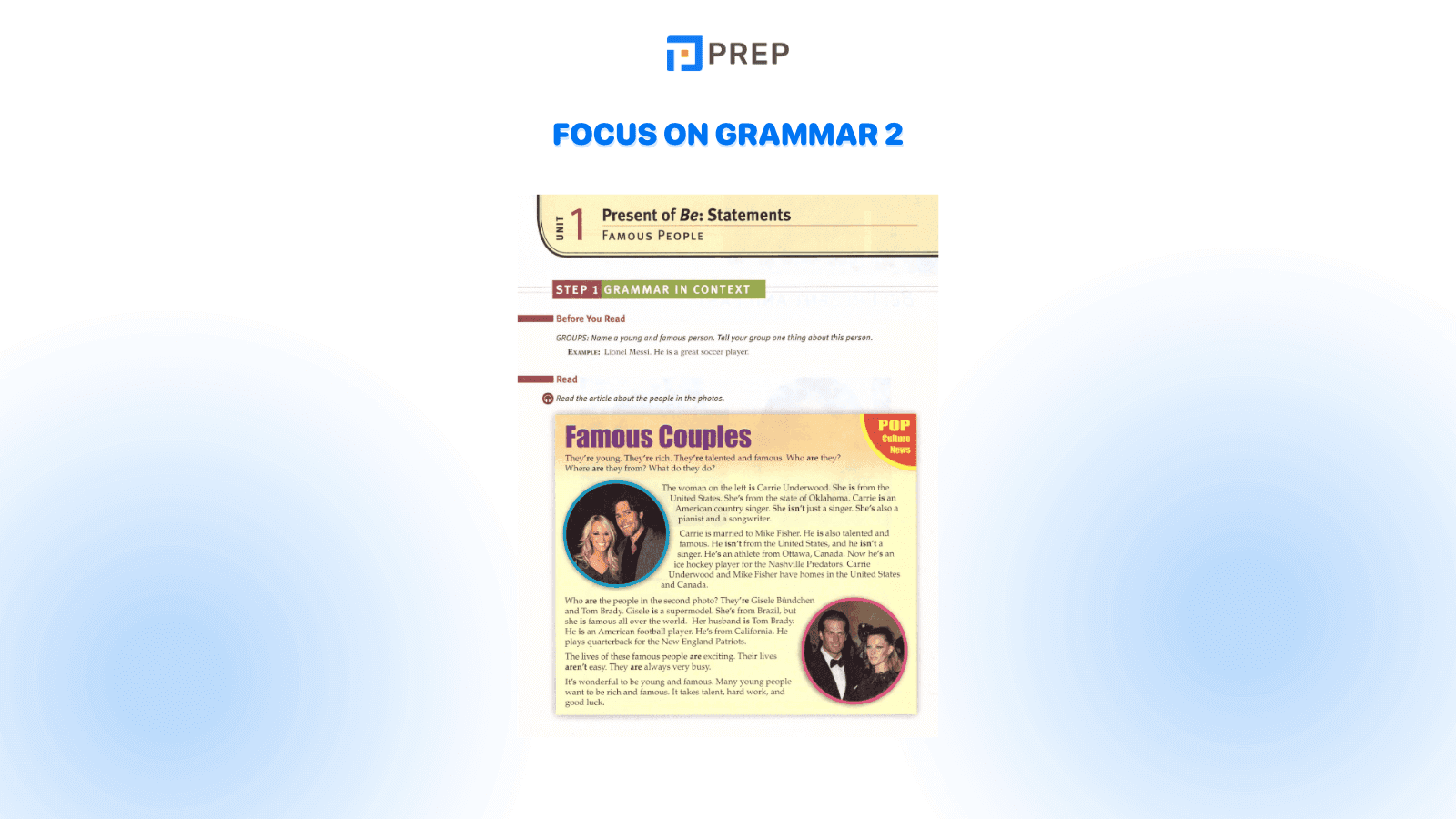
|
Book structure |
Detailed content |
|
|
Welcome to Focus on Grammar |
General introduction to Focus on Grammar 2. |
|
|
Scope and Sequence |
Detailed book map of the Focus on Grammar book. |
|
|
Getting Started: Classroom Instructions |
Familiarize yourself with symbols and requirements in the Focus on Grammar book. |
|
|
Unit 1 |
Present of Be: Statements |
Instructions on how to use the verb "to be" in the present tense. |
|
Unit 2 |
Present of be: Yes/No Questions and Wh - Questions |
Instructions on how to use the verb "to be" in the present tense in interrogative sentences. |
|
Unit 3 |
Past of Be: Statements, Yes/No Questions, Wh - Questions |
Instructions on how to use the verb "to be" in the present tense in Yes/No questions. |
|
Unit 4 |
Count Nouns and Proper Nouns |
Instructions on how to use countable nouns and proper nouns. |
|
Unit 5 |
Descriptive Adjectives |
Instructions on how to use descriptive adjectives. |
|
Unit 6 |
Prepositions of Place |
Instructions on how to use prepositions of place. |
|
Unit 7 |
Past of Be: Statements, Yes/No Questions |
Instructions on how to use the verb "to be" in the past tense in Yes/No questions. |
|
Unit 8 |
Past of Be: Wh - Questions |
Instructions on how to use the verb "to be" in the past tense with question words. |
|
Unit 9 |
Imperatives |
Instructions on how to use imperative sentences. |
|
Unit 10 |
Simple Present: Statements |
Instructions on how to use the simple present tense. |
|
Unit 11 |
Simple Present: Yes/No Questions |
Instructions on how to use the simple present tense in Yes/No questions. |
|
Unit 12 |
Simple Present: Wh - Questions |
Instructions on how to use the simple present tense with question words. |
|
Unit 14 |
Simple Present: Be and Have |
Instructions on how to use the simple present tense with the verbs "to be" and "Have." |
|
Unit 15 |
Present Progressive: Statements |
Instructions on how to use the present continuous tense. |
|
Unit 16 |
Present Progressive: Yes/No Questions |
Instructions on how to use the present continuous tense in Yes/No questions. |
|
Unit 17 |
Present Progressive: Wh - Questions |
Instructions on how to use the present continuous tense with question words. |
|
Unit 18 |
Possessive Nouns: This/That/These/Those |
Possessive nouns: This/That/These/Those. |
|
Unit 19 |
Count and Non - count Nouns; Some and Any |
Countable nouns and uncountable nouns; Some and Any. |
|
Unit 20 |
A/ An and The; One and Ones |
Instructions on how to use articles A/An and The; One and Ones. |
|
Unit 21 |
Can/ Can’t |
Instructions on how to use the modal verb Can/Can't. |
|
Unit 22 |
Simple Past; Regular verbs |
Instructions on how to use the simple past tense; Regular verbs. |
|
Unit 23 |
Simple Past: Regular and Irregular Verbs; Yes/No Questions |
Instructions on how to use the simple past tense: Regular and irregular verbs; Yes/No questions. |
|
Unit 24 |
Simple Past: Wh - Questions |
Instructions on how to use the simple past tense: questions with question words. |
|
Unit 25 |
Subject and Object Pronouns |
Subjects and pronouns. |
|
Unit 26 |
How much/How many; Quantity Expressions |
Instructions on how to use How much/How many; Quantity Expressions: There is/There are. |
|
Unit 27 |
Nouns and Adjectives Modifiers |
Instructions on how to use nouns and attributive adjectives. |
|
Unit 28 |
Comparatives Adjectives |
How to use comparative adjectives. |
|
Unit 29 |
Prepositions of Time: In, On, At |
Prepositions of time: In, On, At. |
|
Unit 30 |
Future with Be going to |
Instructions on the future tense with "Be going to." |
|
From Grammar to Writing |
Applying grammar knowledge to writing skills. |
|
|
Appendices |
Appendix of symbols. |
|
|
Glossary of Grammar Terms |
Concepts of grammar knowledge. |
|
|
Puzzles, Games and Information Gap Answer Key |
Grammar-related games. |
|
|
Unit Review Answer Key |
Exercise answers. |
|
|
Index |
Reference materials appendix. |
|
3. Focus on Grammar 3
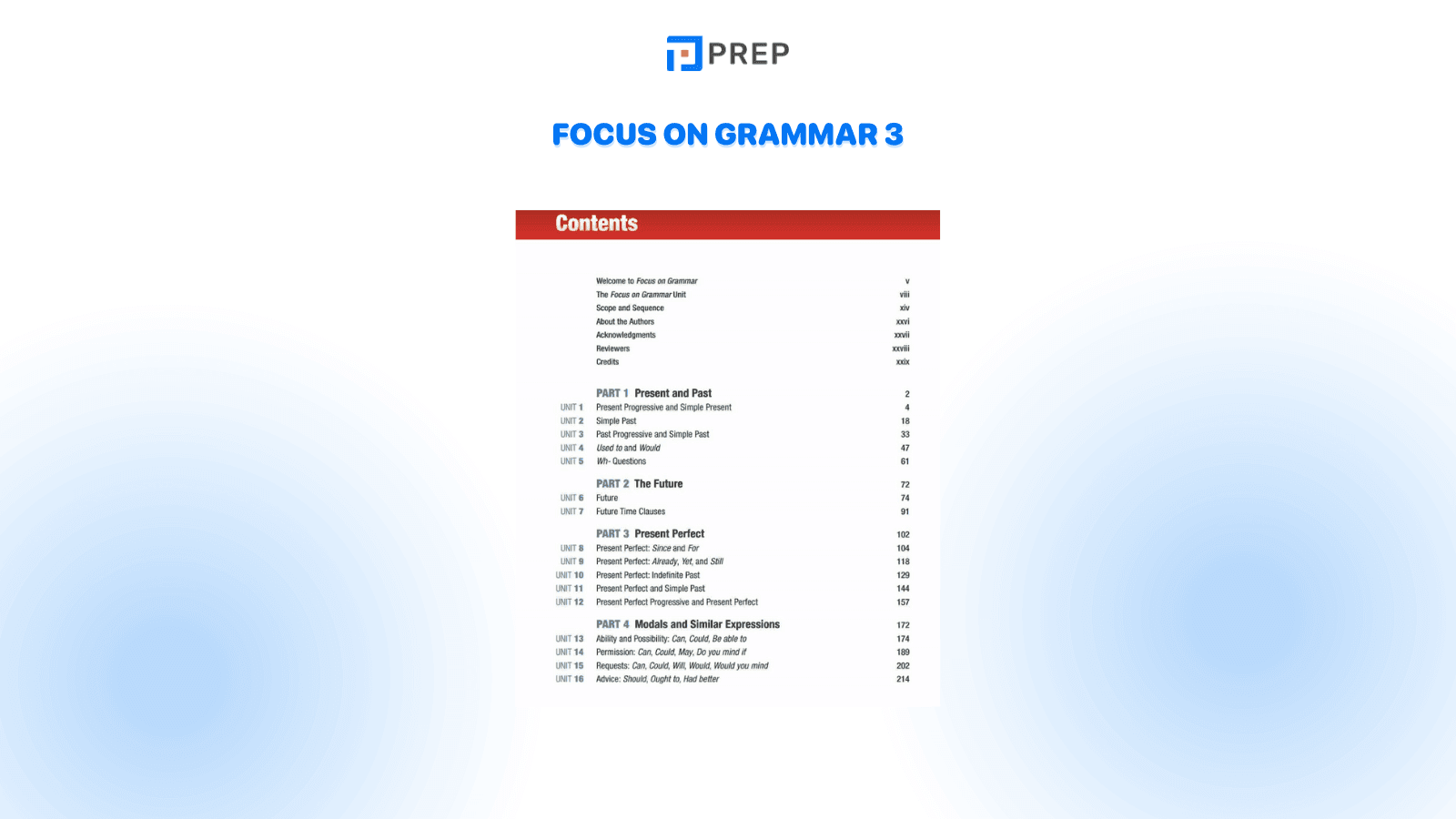
|
Book structure |
Detailed content |
|
|
Introduction |
General Introduction to Focus on Grammar 3 and the author. |
|
|
Tour a unit |
The knowledge covered in one unit. |
|
|
Part I |
Present, Past and Future: Review and Expansion |
Chapter 1 provides instruction on the present, past, and future tenses. |
|
Part II |
Pronouns and Phrasal verbs |
Chapter 2 guides learners on the usage of pronouns and verb phrases. |
|
Part III |
Modals and similar expressions |
Chapter 3 introduces methods and similar expressions. |
|
Part IV |
Present perfect |
Chapter 4 instructs on the usage of the present perfect tense. |
|
Part V |
Nouns and Articles: Review and Expansion |
Chapter 5 introduces nouns and articles. |
|
Part VI |
Adjectives and Adverbs |
Chapter 6 introduces prepositions and adverbs. |
|
Part VII |
Gerunds and Infinitives |
Chapter 7 introduces gerunds and infinitives. |
|
Part VIII |
More modals and similar expressions |
Chapter 8 provides knowledge on defective verbs. |
|
Appendices |
Appendix: Irregular verb chart, uncountable nouns, verb phrase collocations. |
|
|
Glossary of grammar terms |
Definitions of grammar structures. |
|
|
Review tests answer key |
Exercise answers. |
|
|
Index |
Supplementary materials appendix. |
|
4. Focus on Grammar 4
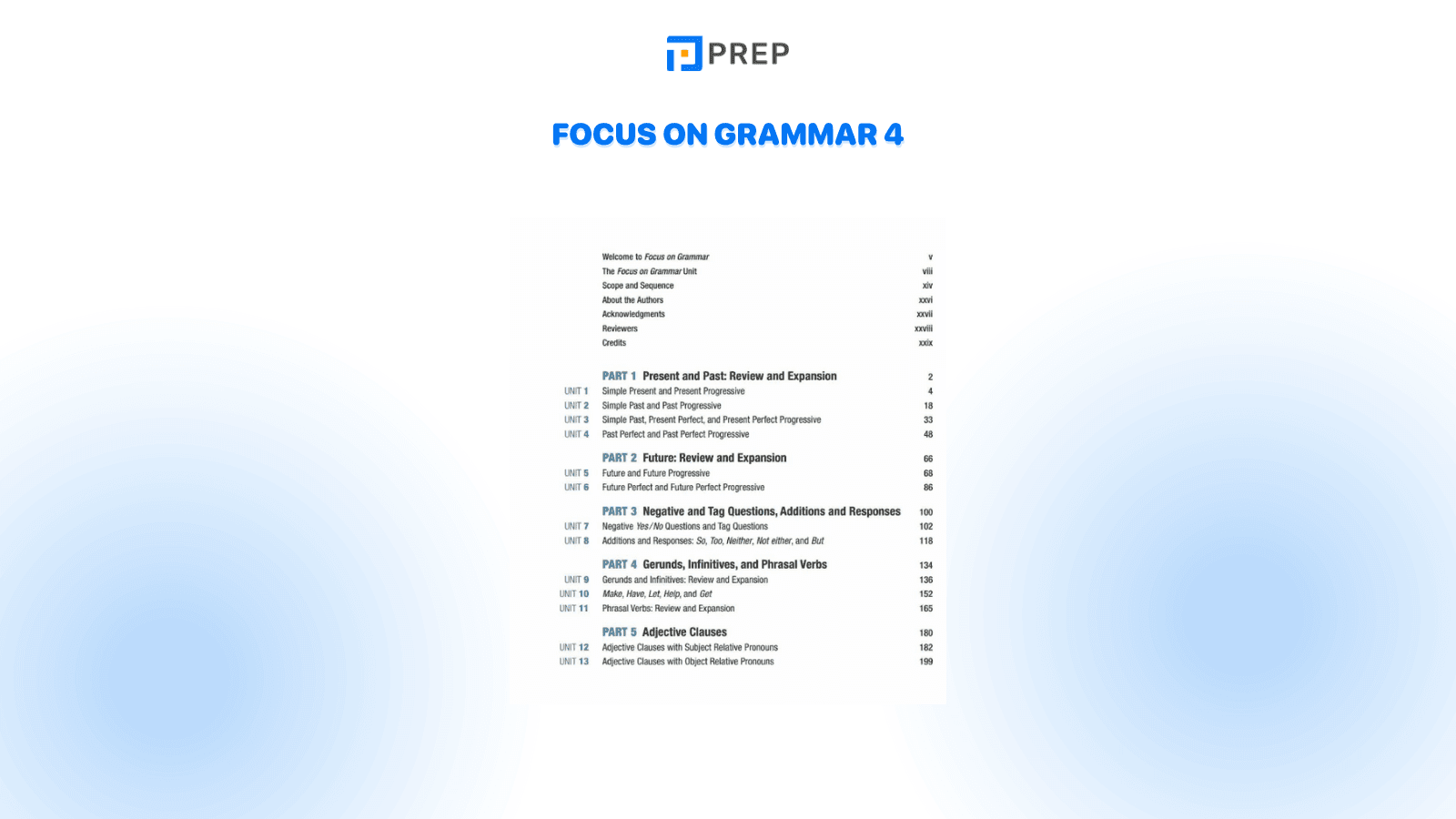
|
Book structure |
Detailed content |
|
|
Introduction |
General Introduction to Focus on Grammar 4 and the author. |
|
|
Tour a unit |
The knowledge covered in one unit. |
|
|
Part I |
Present and Past: Review and expresion |
Knowledge summary and expansion of the Present and Past tenses. |
|
Part II |
Future: Review and Expansion |
Knowledge summary and expansion of the Future tense |
|
Part III |
Negative questions and tag questions, additions and responses |
Instruction on negative sentences, tag questions, conditionals, and responses. |
|
Part IV |
Gerunds and infinitives |
Instruction on gerunds and infinitives. |
|
Part V |
Phrasal verbs |
Instruction on phrasal verbs. |
|
Part VI |
Adjective clauses |
Instruction on adjective clauses. |
|
Part VII |
Modal: Review and Expansion |
Knowledge summary and expansion of defective verbs. |
|
Part VIII |
The passive |
Instruction on passive voice. |
|
Part IX |
Conditionals |
Instruction on conditionals. |
|
Part X |
Indirect speech and embedded questions |
Instruction on indirect speech and complex questions. |
|
Appendices |
Appendix: Irregular verb chart, uncountable nouns, verb phrase collocations. |
|
|
Glossary of grammar terms |
Definitions of grammar structures. |
|
|
Review tests answer key |
Exercise answers. |
|
|
Index |
Supplementary materials appendix. |
|
5. Focus on Grammar 5
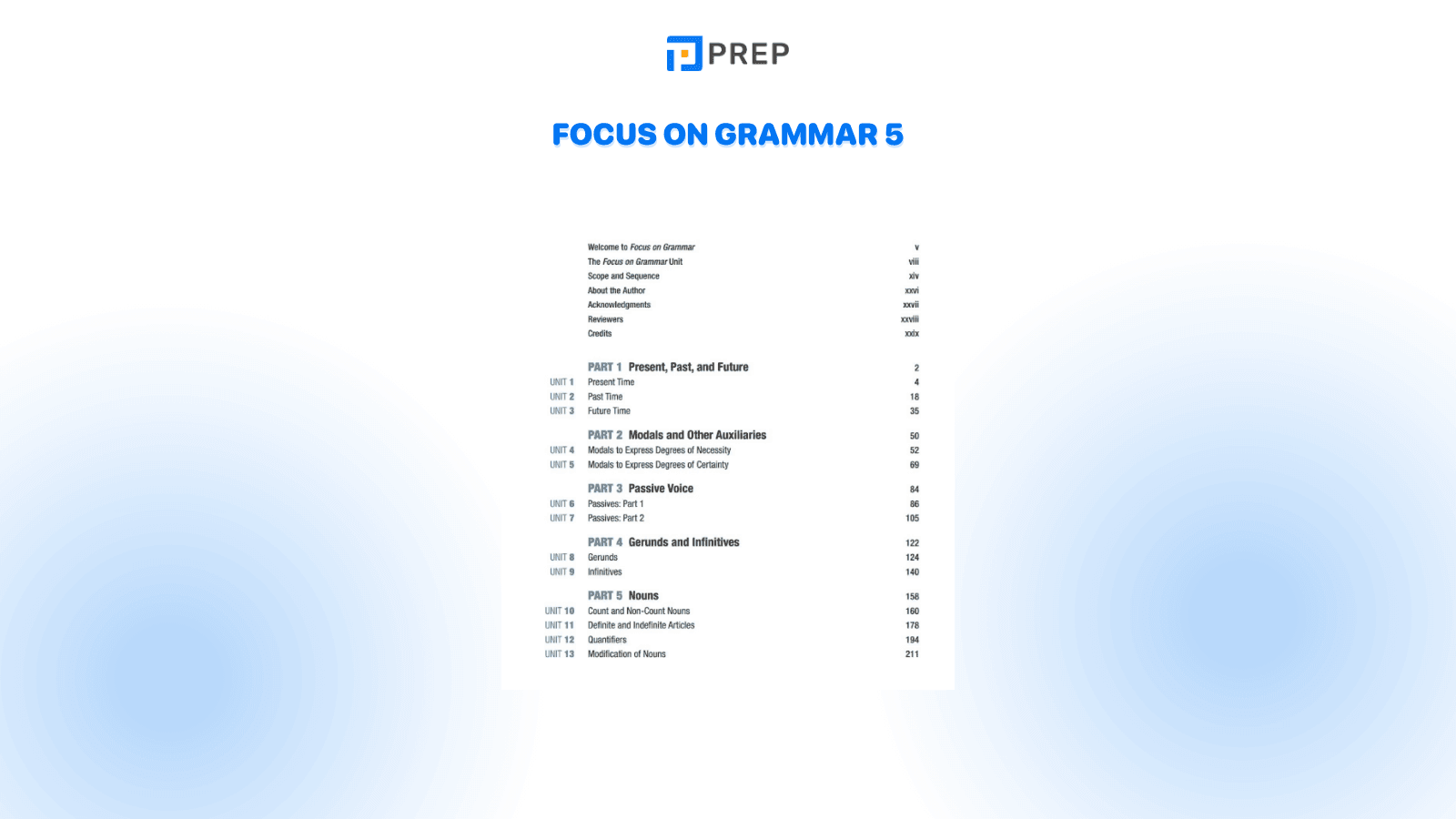
|
Book structure |
Detailed content |
|
|
Welcome to Focus on Grammar |
Introduction to the 5th edition of Focus on Grammar 5. |
|
|
The Focus on Grammar Unit |
Details of the lessons in Focus on Grammar. |
|
|
Scope and Sequence |
Scope and sequence of the presented knowledge in the book. |
|
|
About the Author |
Introduction to the author. |
|
|
Acknowledgments |
The purpose of creating Focus on Grammar 5. |
|
|
Reviewers |
User reviews and opinions. |
|
|
Credits |
Supplementary materials section |
|
|
Part I |
Present, Past and Future |
Instruction on the present, past, and future tenses |
|
Part II |
Modals and Other Auxiliaries |
Understanding defective verbs and auxiliary verbs |
|
Part III |
Passive Voice |
Providing knowledge of the passive voice |
|
Part IV |
Gerunds and Infinitives |
Introduction to gerunds and infinitives. |
|
Part V |
Nouns |
Referencing noun knowledge |
|
Part VI |
Adjectives clauses |
Providing knowledge of adjective clauses |
|
Part VII |
Adverbs |
Instruction on adverbs |
|
Part VIII |
Nouns Clauses |
Introduction to noun clauses. |
|
Part IX |
Conditionals and the Subjunctive |
Understanding conditionals and hypothetical sentences |
|
Appendices |
Appendix of symbols. |
|
|
Glossary of Grammar Terms |
Grammar concepts and explanations. |
|
|
Unit Review Answer Key |
Exercise answers. |
|
III. Pros and Cons of Focus on Grammar
What are the notable advantages and disadvantages of the 5-book series Focus on Grammar? Let's explore them right away with PREP!
1. Pros
Advantages of Focus on Grammar
- Grammar-focused: As mentioned in the title, Focus on Grammar strongly emphasizes the teaching and practice of English grammar. This helps learners understand and use grammar accurately.
- Clear structure: The book has a clear structure with lessons divided into specific grammar units, making it easy for learners to follow and progress step by step.
- Realistic exercises: Focus on Grammar provides numerous practical exercises and real-life examples that help learners apply grammar in everyday communication situations. This helps them develop the ability to use grammar in real-life contexts.
- Detailed explanations: The book includes detailed explanations for exercises, helping learners understand grammar concepts better and effectively correct mistakes.
- Diverse levels: Focus on Grammar offers various versions and levels, from basic to advanced, suitable for a wide range of learners.
2. Cons
Disadvantages of Focus on Grammar may include:
- Overemphasis on grammar: While it is an advantage for those who want to focus on learning grammar, the books may lack balance in developing listening, speaking, and writing skills.
- Lack of listening and speaking practice: Focus on Grammar focuses on grammar in writing and reading but does not provide much material for listening and speaking practice. This can be a limitation for learners who want to develop practical communication skills.
- Lack of regular updates: English grammar can change over time, and the versions of Focus on Grammar may become outdated if not regularly updated.
IV. Reader Feedback on Focus on Grammar
What do English learners think of the book Oxford Grammar for Schools? Let's listen to some shared opinions on English learning forums below!
- Joseph in the "Grammar is easy" group shared, "Focus on Grammar emphasizes teaching and practicing grammar knowledge. This can help learners understand grammar structures and use them accurately. Moreover, the book provides many exercises and examples from daily life to help learners apply grammar knowledge to real-life situations."
- Van Quyet in the "Tiếng Anh không lên xóa group" group said, "Focus on Grammar has an easy-to-understand and user-friendly structure, with clear explanations and practical exercises. It is suitable for different proficiency levels, with various versions for learners at different levels, from beginners to more advanced learners."
V. Effective Ways to Study Focus on Grammar
How can you conquer the 5 books in the Focus on Grammar series? Let's listen to the author's advice to help you master grammar in Focus on Grammar quickly and effectively with PREP!
- Step 1: "Grammar in Context": In this section, learners will focus on the highlighted target structures. These structures often appear in conversations, press articles, essays, blogs, etc.
- Step 2: "Grammar Presentation": After familiarizing yourself with the highlighted structures in the book, you will delve deeper into the structures through illustrative examples, notes, and appropriate usage for each context.
- Step 3: "Focus Practice": In this section, you will apply the theoretical knowledge from the previous steps to complete practical exercises.
- Step 4: "Communication Practice": Finally, you will practice listening and pronunciation to apply the acquired knowledge more creatively.
VI. Where to Buy Focus on Grammar?
Please be advised that downloading unauthorized educational materials constitutes a violation of copyright law and significantly undermines the integrity of the publishing industry, ultimately compromising the quality and reliability of your educational resources. We strongly encourage responsible academic conduct through the acquisition of legitimate Focus on Grammar materials from authorized distributors to ensure optimal learning outcomes.
PREP remains committed to supporting your language proficiency development through the provision of authentic, professionally curated educational content. Authorized publications are available through the following verified channels:
|
Buy the book online |
Amazon Pearson ...... |
The article on PREP has provided a detailed review of the book's content structure in the 5-book Focus on Grammar series, along with effective study methods. We wish Preppies success in finding the book that suits their abilities and successfully conquering English. Visit PREP regularly to receive even more high-quality English learning materials.

Hi I'm Chloe, and I am currently serving as an Product Content Administrator at Prep Education. With over five years of experience in independent online IELTS study and exam preparation, I am confident in my ability to support learners in achieving their highest possible scores.
Comment
Premium content
View allPersonalized roadmap
Most read












